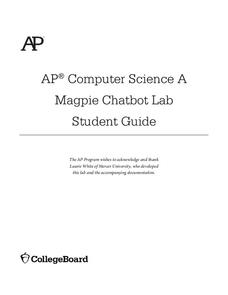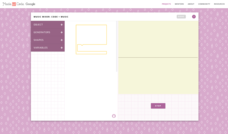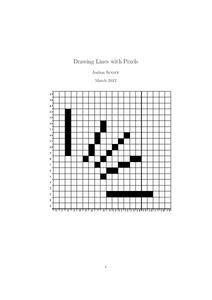College Board
AP® Computer Science A: Magpie Chatbot Lab Student Guide
How is your computer or phone able to talk to you? Explore the tasks needed for a computer to understand human voice input and then write code for a Chatbot with this lab guide.
College Board
Strategies for Teaching AP Computer Science
Implement strategies from the beginning to the end. A collection of strategies and lessons span from the first day of school to after the exam. Resources cover basic information such as computer ethics and top 10 tips to a lesson on how...
Computer Science Unplugged
Conversations with Computers—The Turing Test
Will the real computer please stand up? The premise of this activity is for the class to ask questions to a human and to a computer and to determine which is which. The class asks a given set of questions, and the person playing the role...
Teach Engineering
Computer Simulation of an Artificial Neural Network
Ready to learn about machine learning? Pupils explore neutral networks and machine learning by analyzing the logic used in a single perceptron model. They consider its weaknesses and then use a multi-layer perceptron model to run...
Teach Engineering
Computer Simulation of the Sonoran Desert Community
See how changes in initial populations and parameters affect a biological community. Individuals use a special software program to simulate a desert community with five species. They adjust initial populations to see how the community...
Google
Wonder Woman
Training for battle is really a set of sequences, just like computer science. Scholars program a code that guides Diana from Wonder Woman through a path that avoids her enemies. They learn about how sequences play a role in computer...
Teach Engineering
Automatic Floor Cleaner Computer Program Challenge
Have your class use the engineering design process to program a vacuum robot. Using computer engineering concepts, teams program an automatic floor cleaner to traverse designated patterns.
Google
Rookie Collage
No there's no need to piece together computer science resources. A fun Made with Code project challenges scholars to develop a collage with a Rookie theme using computer code. They learn about encapsulation, objects, and properties in...
Khan Academy
Welcome to the Computer Science Platform
You don't need to know how to code in order to teach your students! Show them learning is a lifelong skill by learning along with them. Take this activity for example; the code is on the left, and the result is on the right. Can you...
Google
Code for Equality
It's my belief that all learners should have equal access to computer science projects! Young computer scientists learn about variables, encapsulation, sequences, and objects in block-based coding. They create a collage by first...
Google
Mary Poppins Returns
Make Mary Poppins proud. Young computer scientists use block-based coding to create snowflake animations with a Mary Poppins theme. They learn how to apply sequences, actions, and loops in computer science.
Google
Teacher Appreciation
Show your teacher you care. Young scholars use the Blockly programming language to create a card for their teachers. Using variables, encapsulation, objects, and sequences helps advance their computer science knowledge at the same time.
Computer Science Unplugged
Lightest and Heaviest—Sorting Algorithms
How do computers sort data lists? Using eight unknown weights and a balance scale, groups determine the order of the weights from lightest to heaviest. A second worksheet provides the groups with other methods to order the weights. The...
Computer Science Unplugged
Battleships—Searching Algorithms
How does a computer perform a search in order to find data? The lesson begins with a demonstration on finding one number out of 15. Pairs then play three games of Battleship by using different search techniques. The lesson...
Computer Science Unplugged
Beat the Clock—Sorting Networks
Can multiple computers sort a list faster than one? Using a network drawn with chalk outside, groups move through the decision network to sort numbers. A series of extension questions come with the lesson and can be used in the same...
Smithsonian Institution
What's the Code? Coding Robot Movements Using Sound
Tap into the desire to learn about computer codes. Pupils apply the Tap Code and the Polybius Square to send secret codes using sound. They design a code that tells a robot what movements to make and then test out their code using one of...
Google
Emojify
Face your computer coding fears. Young computer scientists take part in a computer programming project using block-based coding. They create a personal emoji consisting of a face, eyes, mouth, and accessories that conveys a character's...
Beauty and Joy of Computing
Conditional Blocks
If you use the resource, then pupils will understand conditional block instructions. In the first lab of a six-part unit, pupils learn how to use conditional statements (if/then) in block instructions for computer programming. They apply...
Google
Design Your Own Emoji Holiday
You'll want to rank the project with a smiley face. Future computer scientists complete a fun activity where they design a holiday-themed emoji. They use block-based coding and learn about the concepts of variables, encapsulation,...
Google
Accessorizer
It's all about the accessories. Scholars complete a computer coding activity where they add accessories, like glasses, shirts, hats, and wigs, to a picture. They learn to apply block-based coding to accomplish the fun task.
Google
Music Mixer
Here's an activity sure to be music to your ears. Pupils create a music composition using block-based computer coding. They add different sound rings, and then adjust the number and speed of sounds to create their composition pieces.
Society of Petroleum Engineers
Renewable and Nonrenewable Energy
Energize an environmental science unit on natural resources with this collection of instructional materials. From simple coloring sheets for primary grade children, to guiding questions for a high school research...
Foundation for Water & Energy Education
How Can Work Be Done with Water Power? Activity C
Third in a set of lessons regarding reservoirs, dams, and hydropower, this involves a two-day hydropower plant simulation. Collaborative groups build, maintain, and finance the plant. The transparency of the reservoir setup can be...
Computer Science Unplugged
Drawing Lines with Pixels
How do the computers keep it straight? Using the provided algorithms, class members draw a line and a circle using pixels. They then check the drawings using a straight edge and compass to determine the accuracy of their...
Other popular searches
- Computer Science
- Computers. Computer Science
- Computer Science Excel
- Computer Science Java
- B Ed Computer Science
- Computer Science and Science
- History of Computer Science
- Computer Science History
- Computer Science Worksheets
- Networking Computer Science
- Computer Science C Programs
- Computer Science C++programs























